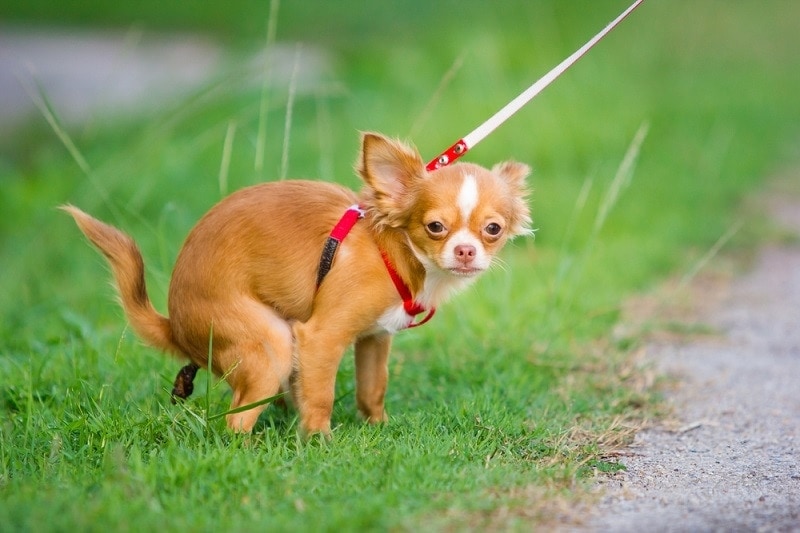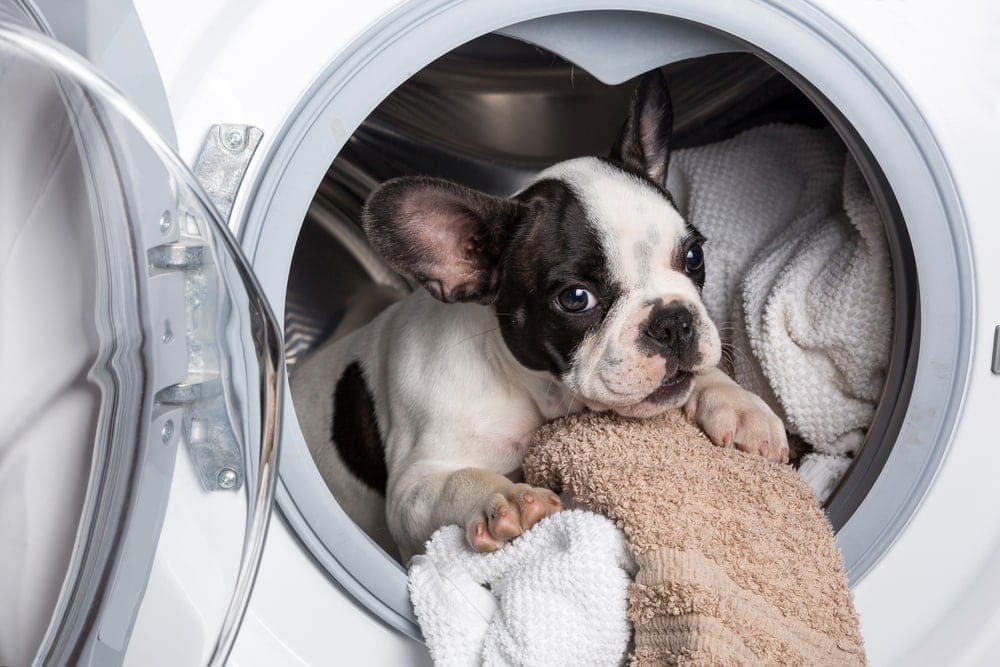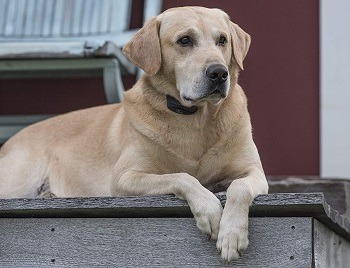Do German Shepherds Make Good Guard Dogs? Breed Facts & FAQ
Updated on
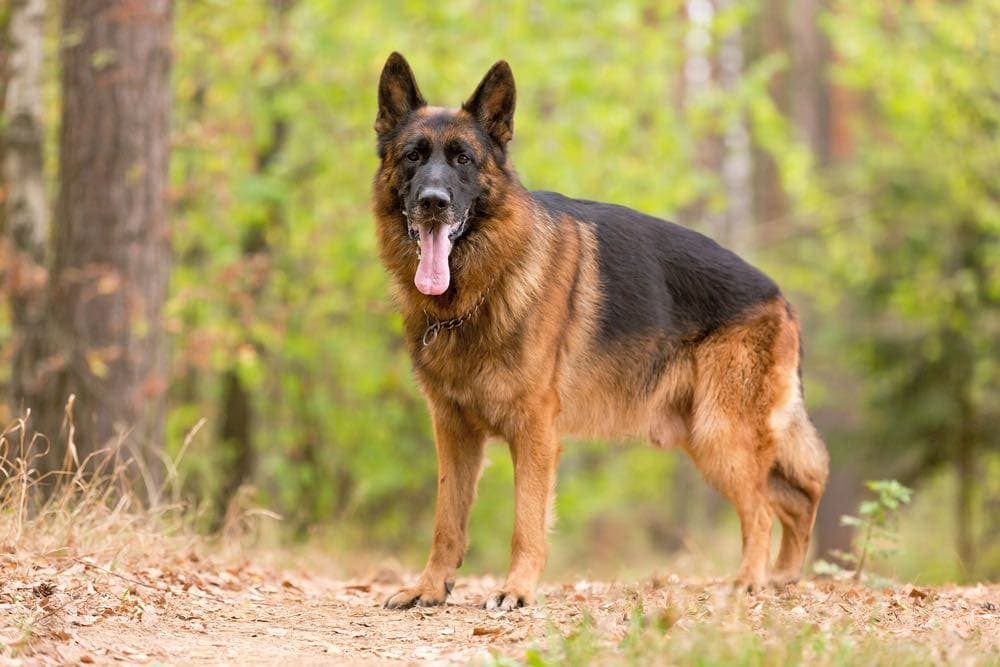
Click to Skip Ahead
There are various reasons that someone would want a guard dog. Canines have been used as protectors for centuries, doing everything from guarding flocks of sheep against predators to patrolling a protected area against intruders.
Many different breeds have been used extensively as guard dogs, such as the Doberman and the Rottweiler, but what about German Shepherd dogs (GSDs)? German Shepherds are among the best guard dogs out there! If you’re looking for a dog that will love and protect your family and your property, look no further than the German Shepherd.
Here, we look at what makes a good guard dog and how GSDs excel in this role. We also examine the difference between guard dogs and other protective dog roles and what kind of training goes into the making of a guard dog.
German Shepherd Guard Dog
When you think about a guard dog, what’s the first thing that comes to mind? A stoic dog walking next to a security guard or a snarling, vicious dog holding an intruder at bay? While both scenarios have and do happen, it’s certainly not all that there is in the day of a working guard dog.
Guard dogs are defined as dogs that are trained to protect a place.1 To expand on that, they are specially trained dogs that protect some form of property or people from intruders. This is typically private property, such as homes or businesses, and families or people who need protection. Guard dogs are trained to attack on command and are often perceived as aggressive, but they are also trained to stop their actions.
Several different roles fall into the protection line of work for dogs.
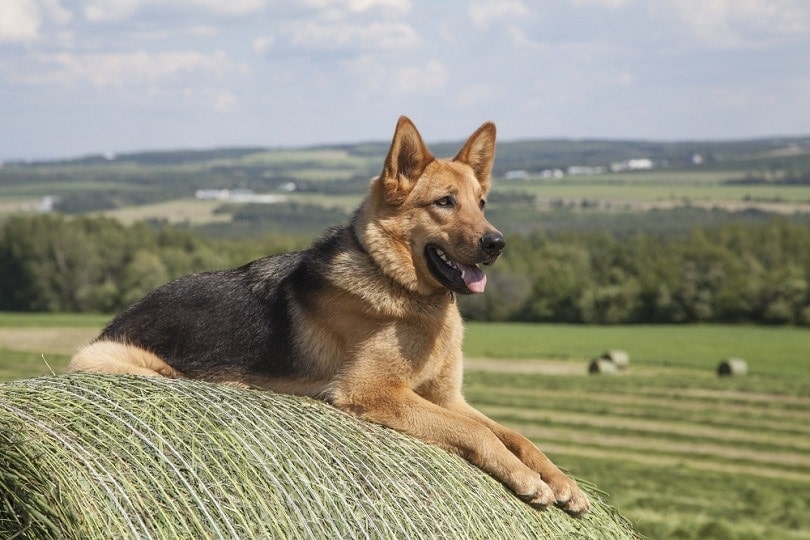
The 4 Types of Protection Dogs
There are differences between guard dogs and other protection dog roles, so let’s go over these various jobs.
1. Sentry Dogs
These dogs have been trained to work with minimal supervision in an enclosed or fenced area. They are quite similar to guard dogs. They will also attack when necessary and keep any threats or intruders away. Since they tend to work with little human supervision, these dogs are typically independent, confident, and intelligent.
2. Watchdogs
Watchdogs do what their name implies: They watch. These dogs will bark out an alert if they see or hear any unusual activity, but they don’t usually take any other action, so it’s up to the human to deal with the situation. Most dogs can actually be watchdogs, even small breeds, and they don’t need any extensive training because the barking is usually instinctive to the breed.
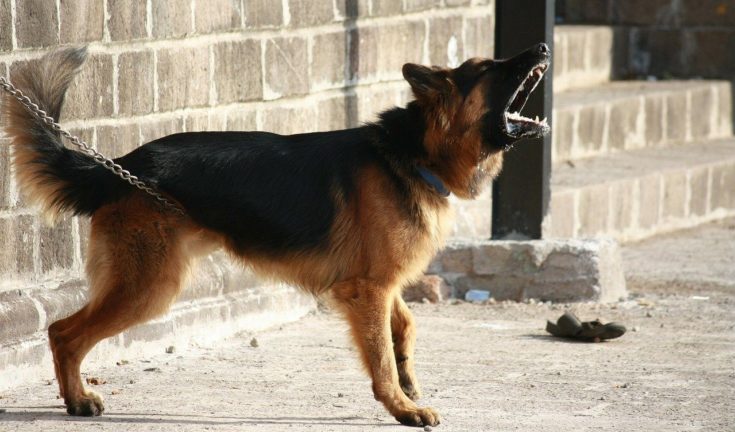
3. Personal Protection Dogs
These dogs undergo specialized training to take on the job of protecting a person or a group (like a family). They need to learn the difference between friend and enemy and adapt to unpredictable situations and environments. These dogs form strong and solid bonds with the people they protect, so they also act as companion dogs. Their love for their owners and the extensive training that they receive makes them exceptional protection dogs.
4. Attack Dogs
Attack dogs need to have the same qualities as a guard dog, watchdog, sentry dog, and personal protection dog because they ultimately perform all these tasks. In addition to the training for all these skills, they receive training to attack on command. Attack dogs are traditionally used by the military and police and are considered dangerous if they are in the wrong hands, so they are not usually suitable as companion dogs.
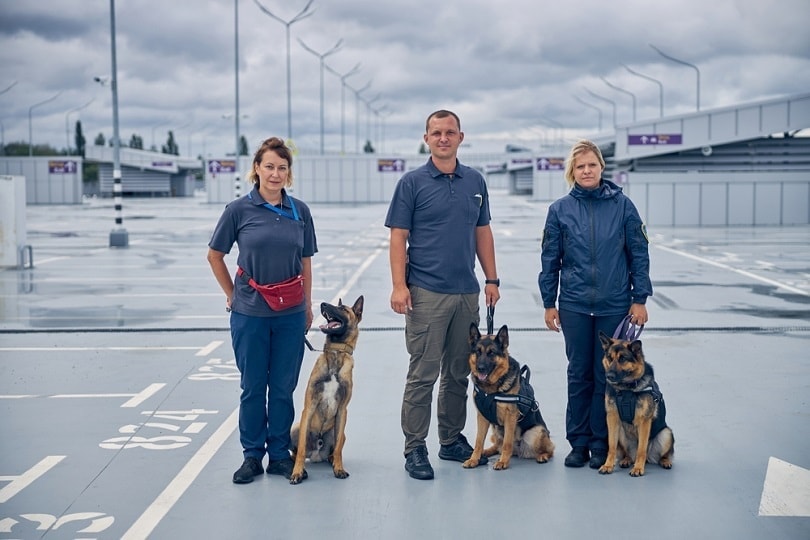
 What Makes a Great Guard Dog?
What Makes a Great Guard Dog?
There are several traits that all together, make for a great guard dog. Some people might be under the impression that a dog must be aggressive to be a good guard dog, but it can be quite the opposite. Here’s why.
Strong Work Drive
Guard dogs need a strong work drive because this makes them more trainable and eager to do the work.
Intelligence
Intelligence, like work drive, is necessary for training the dog. These dogs need to learn basic commands easily and have the ability to think for themselves and work out problems.
Courage
In order to be taken seriously, a guard dog must be fearless and able to face potentially dangerous situations and intruders without hesitation.
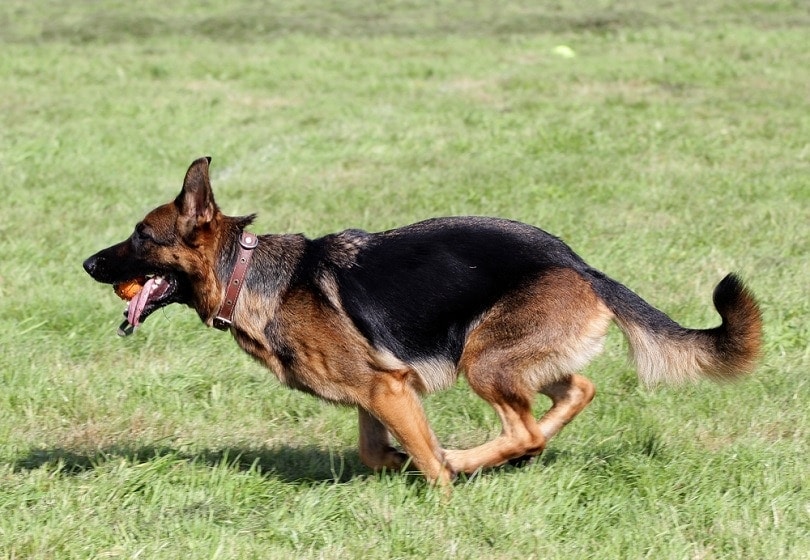
Devotion
Whoever is being protected, whether it’s an entire family or a single person, the guard dog should have unwavering loyalty to them. This devotion will ensure that the guard dog will fulfill their duties.
Love and Affection
Contrary to popular belief, the best kinds of guard dogs can be the most loving and affectionate dogs when with their trusted human family. They are gentle and sweet with young children, but they know when it’s time to go into protection mode.
Protectiveness
Guard dogs should have a natural instinct to protect and defend their territory and families. This includes barking out an alert to their owners.
Intimidating Presence
A large guard dog is undoubtedly more effective than a small one. Many Chihuahuas would love to be guard dogs, but their size wouldn’t necessarily scare off any possible intruders. Sometimes, just the sight of a large dog can stop an incident from occurring.
Focus
Guard dogs need to be watchful and focused and not easily distracted. They are aware of their surroundings and on alert for any changes or possible threats.
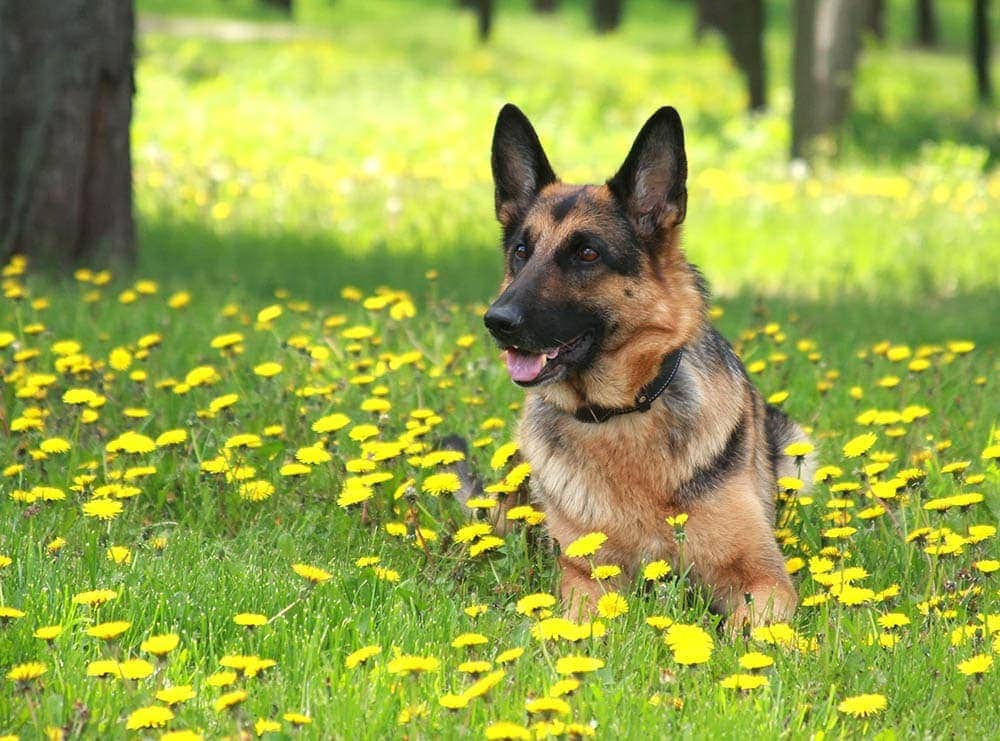
What Makes German Shepherds Great Guard Dogs?
In a nutshell, German Shepherds have all the aforementioned traits.
A Short History
Even though they have “shepherd” in their name, some people might still be surprised to learn that German Shepherds have their origins as sheepdogs. We associate them so strongly as police or security dogs, after all.
GSDs saw their beginnings with Max Emil Friedrich von Stephanitz in 1899, when he purchased Hektor Linksrhein, the first registered German Shepherd. Von Stephanitz believed strongly in breeding a working dog with the swiftness and intelligence of the shepherding dogs.
German Shepherd Traits
The traits of the German Shepherd are bred into them and fit the guard dog mold perfectly. They are among the most devoted and loyal dogs out there and are protectors with a strong work drive. They can think independently and problem solve because of their high intelligence, which also makes them quite trainable. Being shepherd dogs, they are vigilant, watchful, and courageous. Their size also makes them an intimidating presence.
Lastly, GSDs are excellent family dogs that form strong and loving bonds with their families. They have the ability to balance their affection while at home with acting immediately as a protector when the need arises.
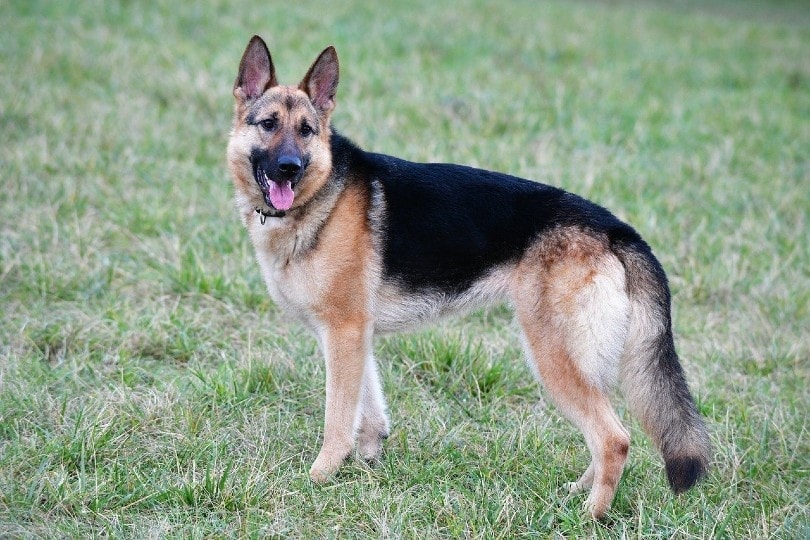
What Kind of Training Do German Shepherds Need?
Early Socialization
Training should begin while they are puppies, and it starts with socialization. They need to be introduced to as many people, animals, environments, and situations as possible. This will help them build up their confidence, and they are less likely to act aggressively when they encounter unusual circumstances.
Obedience Classes
Obedience training is paramount because it teaches them basic commands and will help form an even stronger bond between dog and owner. These classes are also an excellent way to encourage more socialization for the puppy.
Companions
German Shepherds raised to be guard dogs are usually also raised as companion dogs with the family or owner whom they will protect. This is where they learn the difference between being a loving pet and a working guard dog and how to switch between these two roles.
Training
GSDs need to learn the difference between a guest who is a stranger but is welcome in the home and a stranger who is not welcome. There should never be any aggressive behavior while with their families, but they should still be alert for potential trouble. They need to learn to not bark or act aggressively toward anyone or anything that is not a threat.
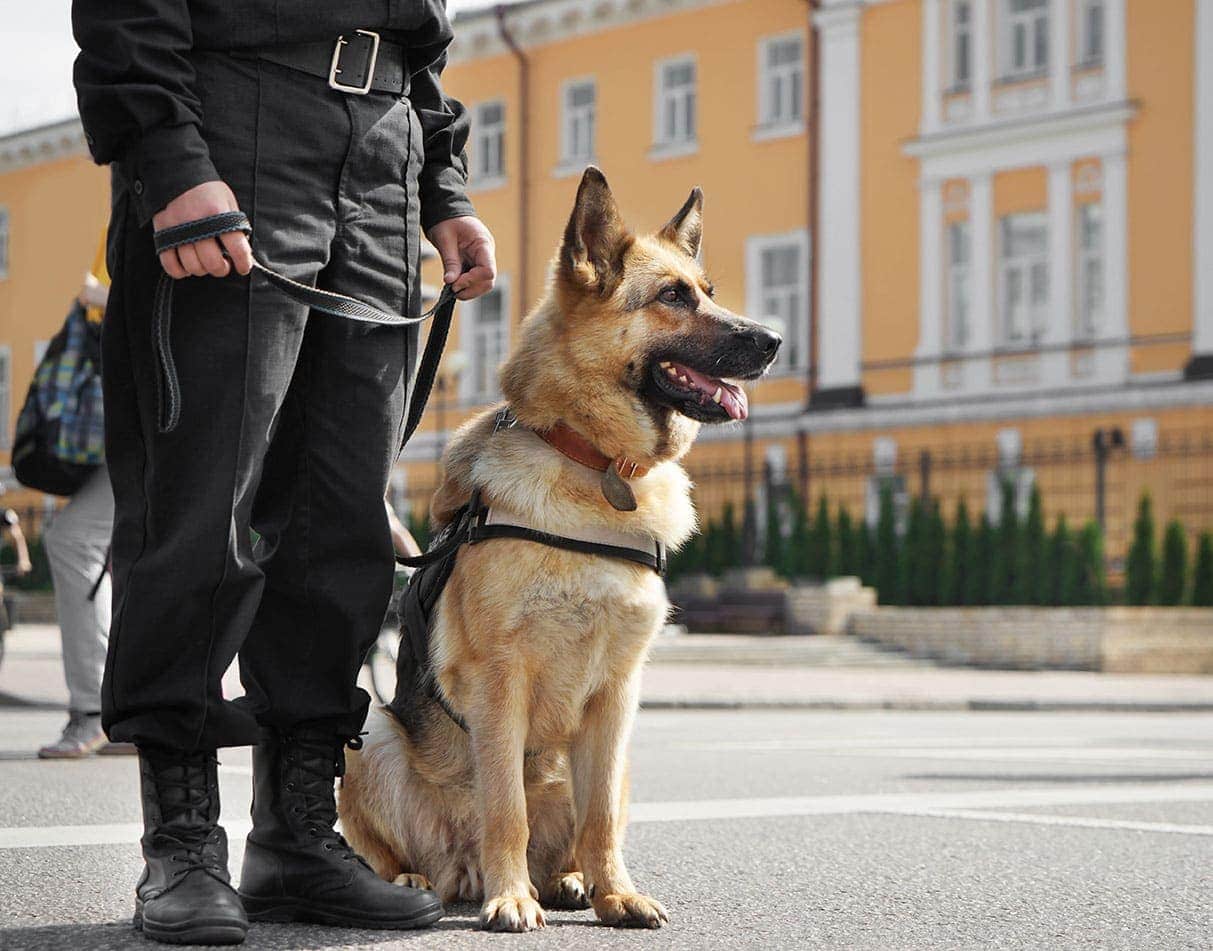
Conclusion
German Shepherds are truly the perfect guard dogs. They possess all the necessary traits and make the most amazing companion dogs. They are naturally protective and affectionate, and with the right training, they can make excellent guard dogs!
A German Shepherd that has had suitable training does need a firm hand, but as long as the training has been done correctly, you’ll have the perfect working and family dog.
Featured Image Credit: Osetrik, Shutterstock

 What Makes a Great Guard Dog?
What Makes a Great Guard Dog?
